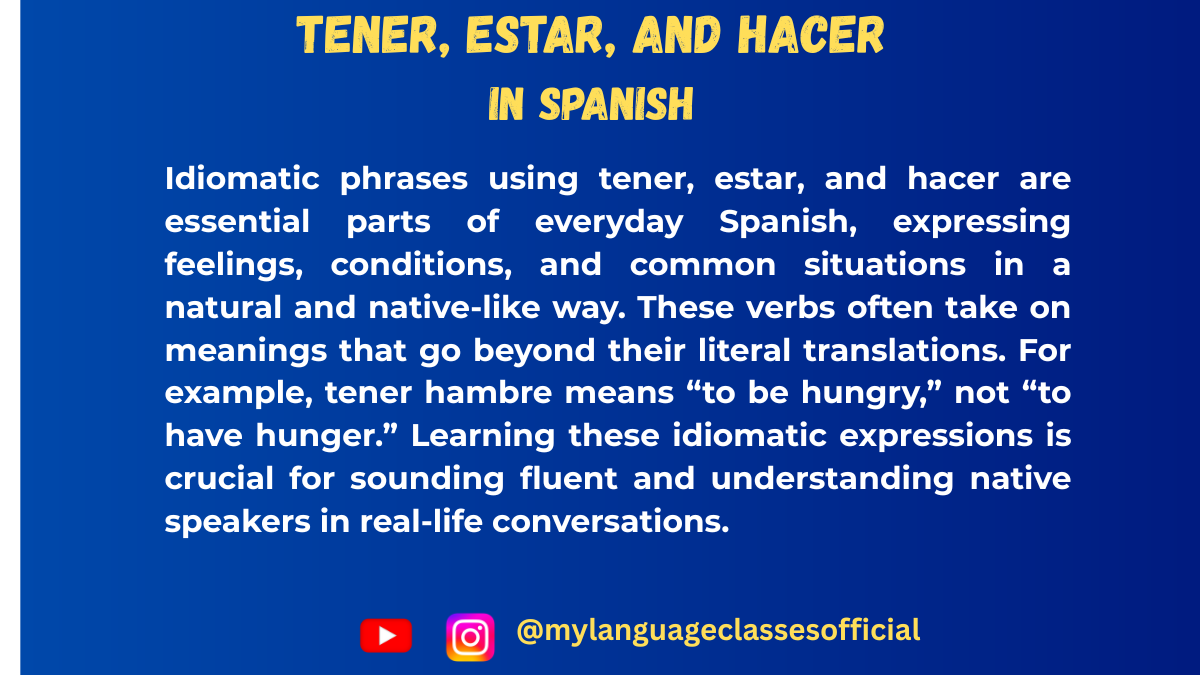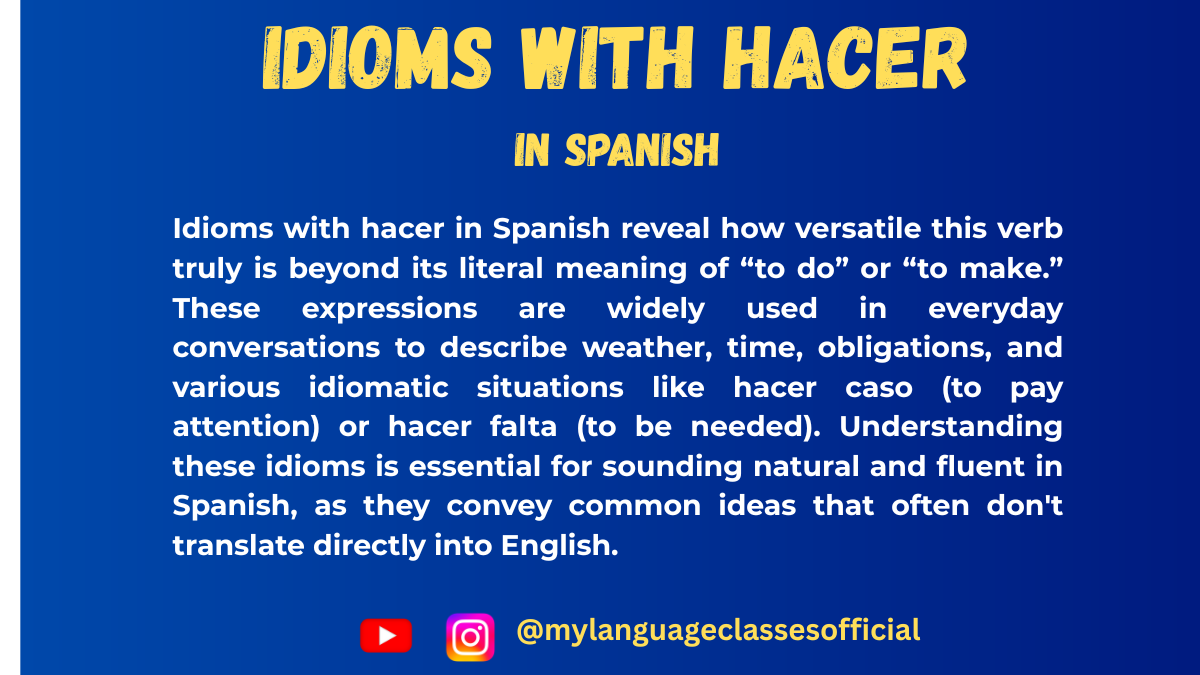Your cart is currently empty!
Tag: how to use hacer in Spanish
-

Idiomatic Phrases Using Tener, Estar, and Hacer in Spanish
Mastering idiomatic expressions is essential for achieving fluency in Spanish. Many common expressions in Spanish use the verbs tener (to have), estar (to be), and hacer (to do/make), which often don’t translate literally into English. In this blog, we will explore frequently used phrases such as tener razón, tener ganas de, estar de acuerdo, and many others, along with their meanings, uses, and examples.
Understanding Tener, Estar, and Hacer in Idiomatic Expressions
In Spanish, some expressions that involve states, desires, or idiomatic ideas use tener, estar, or hacer, instead of ser or other verbs we might expect in English.
- Tener is often used for conditions, feelings, or necessity.
- Estar is used for temporary states, emotions, and agreements.
- Hacer is commonly used for weather expressions and actions.
To form these idiomatic phrases, we follow these patterns:
✅ Tener + noun → (e.g., tener razón – “to be right”)
✅ Estar + prepositional phrase/adjective → (e.g., estar de acuerdo – “to agree”)
✅ Hacer + noun → (e.g., hacer frío – “to be cold (weather-wise)”)
Common Expressions Using Tener, Estar, and Hacer
Here is a list of beginner and intermediate-level expressions along with their meanings and example sentences.
Expression Meaning Example 1 Example 2 Tener hambre To be hungry Tengo hambre, ¿puedo comer algo? (I am hungry, can I eat something?) Los niños tienen hambre después de jugar. (The children are hungry after playing.) Tener sed To be thirsty Después de correr, siempre tengo mucha sed. (After running, I am always very thirsty.) ¿Tienes sed? Hay agua en la nevera. (Are you thirsty? There is water in the fridge.) Tener razón To be right Tienes razón, era una mala idea. (You are right, it was a bad idea.) El profesor tenía razón sobre la respuesta. (The teacher was right about the answer.) Tener ganas de + infinitive To feel like (doing something) Tengo ganas de viajar a España. (I feel like traveling to Spain.) No tengo ganas de salir hoy. (I don’t feel like going out today.) Tener cuidado To be careful ¡Ten cuidado con el perro! (Be careful with the dog!) Debes tener cuidado al cruzar la calle. (You must be careful when crossing the street.) Tener sueño To be sleepy Después de estudiar, tengo mucho sueño. (After studying, I am very sleepy.) Ella siempre tiene sueño por la mañana. (She is always sleepy in the morning.) Estar de acuerdo To agree Estoy de acuerdo contigo. (I agree with you.) Mis padres no están de acuerdo con mi decisión. (My parents do not agree with my decision.) Estar de buen/mal humor To be in a good/bad mood Hoy estoy de buen humor. (Today I am in a good mood.) Después del examen, estaba de mal humor. (After the exam, I was in a bad mood.) Hacer frío/calor To be cold/hot (weather) Hace mucho frío en invierno. (It is very cold in winter.) En la playa, hace calor. (At the beach, it is hot.) Hacer falta To be necessary/to need Hace falta estudiar para el examen. (It is necessary to study for the exam.) Nos hace falta más información. (We need more information.)
More Example Sentences
- Hace mucho viento hoy. (It is very windy today.)
- Tienes razón, esto no es fácil. (You are right, this is not easy.)
- No estoy de acuerdo con esa idea. (I do not agree with that idea.)
- Hace falta paciencia para aprender un idioma. (Patience is necessary to learn a language.)
- Ten cuidado, la carretera está resbaladiza. (Be careful, the road is slippery.)
- Siempre tengo ganas de comer pizza los viernes. (I always feel like eating pizza on Fridays.)
- Mi hermana tiene sueño porque estudió hasta tarde. (My sister is sleepy because she studied late.)
- En verano hace mucho calor en mi ciudad. (In summer, it is very hot in my city.)
- Después del trabajo, mi madre siempre está de buen humor. (After work, my mom is always in a good mood.)
- Los estudiantes no están de acuerdo con las nuevas reglas. (The students do not agree with the new rules.)
Fill in the Blanks
- ______ cuidado cuando cruzas la calle.
- Después de correr, ______ sed.
- ¿Tú ______ de acuerdo con esa decisión?
- Esta sopa está caliente, ______ falta más agua fría.
- En invierno ______ frío, así que uso un abrigo.
- Hoy no ______ ganas de salir.
- Mi hermana siempre ______ sueño por la mañana.
- Tú siempre ______ razón en las discusiones.
- Mis amigos y yo ______ de buen humor porque es viernes.
- ¡______ falta estudiar más para el examen!
Answers:
- Ten
- Tengo
- Estás
- Hace
- Hace
- Tengo
- Tiene
- Tienes
- Estamos
- Hace
Things to Keep in Mind
- Tener expressions use a noun, meaning they follow gender and number rules. Example: Tener hambre (hunger, feminine noun) vs. Tener ganas de (desires, plural noun).
- Estar expressions often use prepositional phrases such as de acuerdo or de buen humor.
- Hacer expressions are commonly used for weather, e.g., Hace frío instead of Es frío.
- Some phrases change based on the subject. Example: Tengo ganas de comer (I feel like eating) vs. Tenemos ganas de viajar (We feel like traveling).
Conclusion
Using idiomatic expressions with tener, estar, and hacer correctly will make your Spanish sound more natural and fluent. These phrases often don’t translate directly into English, so understanding their structure and use in different contexts is essential. Keep practicing these expressions in daily conversations to improve your fluency and confidence in Spanish!
If you enjoyed this lesson, be sure to check out more posts like this on my blog at My Language Classes. Don’t forget to subscribe my YouTube channel and follow me on Instagram for the latest language learning tips and lessons. Leave a comment below to share your thoughts, or ask any questions you have.
Happy learning! 😊
-

Expressions, Idioms, and Proverbs with the Verb “Hacer”
When learning Spanish, understanding the verb hacer (to do or to make) is essential due to its versatile use in daily conversation. Beyond its literal meanings, hacer is also deeply ingrained in various idiomatic expressions and proverbs, which add richness and nuance to the language. Below, we’ll explore common expressions with hacer, their meanings, example sentences, and usage considerations.
1. Basic Uses of Hacer
Hacer can mean “to do” or “to make,” depending on the context. It conjugates irregularly, so it’s crucial to memorize its forms.
Present tense conjugation:
- Yo hago
- Tú haces
- Él/Ella/Usted hace
- Nosotros/Nosotras hacemos
- Vosotros/Vosotras hacéis
- Ellos/Ellas/Ustedes hacen
Examples:
- Yo hago la cena. (I make dinner.)
- ¿Qué haces? (What are you doing?)
2. Common Expressions with Hacer
These are widely used in everyday life and add a natural touch to your Spanish.
Hacer falta – To need/lack
- Meaning: Indicates something is missing or needed.
- Example: Nos hace falta más tiempo para terminar.
(We need more time to finish.)
Hacer caso (de/a) – To pay attention (to)
- Meaning: To heed or follow advice/instructions.
- Example: No hizo caso de mis advertencias.
(He didn’t pay attention to my warnings.)
Hacer daño – To harm/hurt
- Meaning: Refers to causing physical or emotional harm.
- Example: Comer tantos dulces te hará daño.
(Eating so many sweets will harm you.)
Hacer cola – To stand in line
- Meaning: To queue up.
- Example: Tuvimos que hacer cola durante dos horas.
(We had to stand in line for two hours.)
Hacer el papel de – To play the role of
- Meaning: Used in the context of acting or pretending.
- Example: En la obra, ella hace el papel de la reina.
(In the play, she plays the role of the queen.)
Hacer las paces – To make peace
- Meaning: To reconcile after a conflict.
- Example: Decidieron hacer las paces después de la discusión.
(They decided to make peace after the argument.)
Hacer ejercicio – To exercise
- Meaning: Refers to physical activity.
- Example: Hago ejercicio todos los días para mantenerme en forma.
(I exercise every day to stay in shape.)
Hacer buen/mal tiempo – To have good/bad weather
- Meaning: Describes the weather conditions.
- Example: Hoy hace buen tiempo; vamos a la playa.
(The weather is nice today; let’s go to the beach.)
Hacer una pregunta – To ask a question
- Meaning: Standard way of expressing “to ask.”
- Example: ¿Puedo hacerte una pregunta?
(Can I ask you a question?)
Hacer la vista gorda – To turn a blind eye
- Meaning: To ignore something intentionally.
- Example: El profesor hizo la vista gorda ante el ruido en clase.
(The teacher turned a blind eye to the noise in class.)
Hacer de las suyas – To be up to one’s usual antics
- Meaning: Indicates mischief or habitual behavior.
- Example: Juan está haciendo de las suyas otra vez.
(Juan is up to his usual antics again.)
Hacer hincapié en – To emphasize
- Meaning: To stress or underline importance.
- Example: Debemos hacer hincapié en la calidad del proyecto.
(We must emphasize the quality of the project.)
3. Proverbs with Hacer
These proverbs reflect cultural wisdom and are used in both formal and informal contexts.
El que algo quiere, algo le cuesta.
(If you want something, it will cost you something.)
- Highlights the effort required to achieve goals.
Hacerse el tonto.
(To play dumb.)
- Used to describe someone pretending not to understand.
Hacer de tripas corazón.
(To make a heart out of guts.)
- Means to muster courage in difficult times.
Hacer la cama y acostarse en ella.
(Make the bed and lie in it.)
- Suggests accepting the consequences of one’s actions.
4. Things to Keep in Mind
Gender and Number Agreement
While hacer itself doesn’t change based on gender or number, the articles or adjectives accompanying nouns do. For instance:
- Hice una pregunta interesante. (I asked an interesting question.)
- Hicimos muchas tareas complicadas. (We did many complicated tasks.)
Tense Considerations
The meaning of expressions with hacer can vary depending on the tense:
- Present: ¿Qué haces? (What are you doing?)
- Preterite: Hice una llamada. (I made a call.)
- Future: Haré lo necesario. (I will do what is necessary.)
Reflexive Use
Some expressions use the reflexive form:
- Hacerse tarde – (To become late)
- Example: Se está haciendo tarde; vámonos.
(It’s getting late; let’s go.)
- Example: Se está haciendo tarde; vámonos.
5. Practice Tips
- Context is key: Pay attention to the situation to determine the correct meaning of hacer.
- Memorize expressions: Learn idioms in chunks, as they often don’t translate literally.
- Immerse yourself: Use these expressions in conversation to solidify their meanings.
By mastering hacer and its many uses, you’ll enrich your Spanish vocabulary and sound more fluent in everyday conversations. Happy learning!
If you enjoyed this lesson, be sure to check out more posts like this on my blog at My Language Classes. Don’t forget to subscribe my YouTube channel and follow me on Instagram for the latest language learning tips and lessons. Leave a comment below to share your thoughts, or ask any questions you have.
Happy learning! 😊
